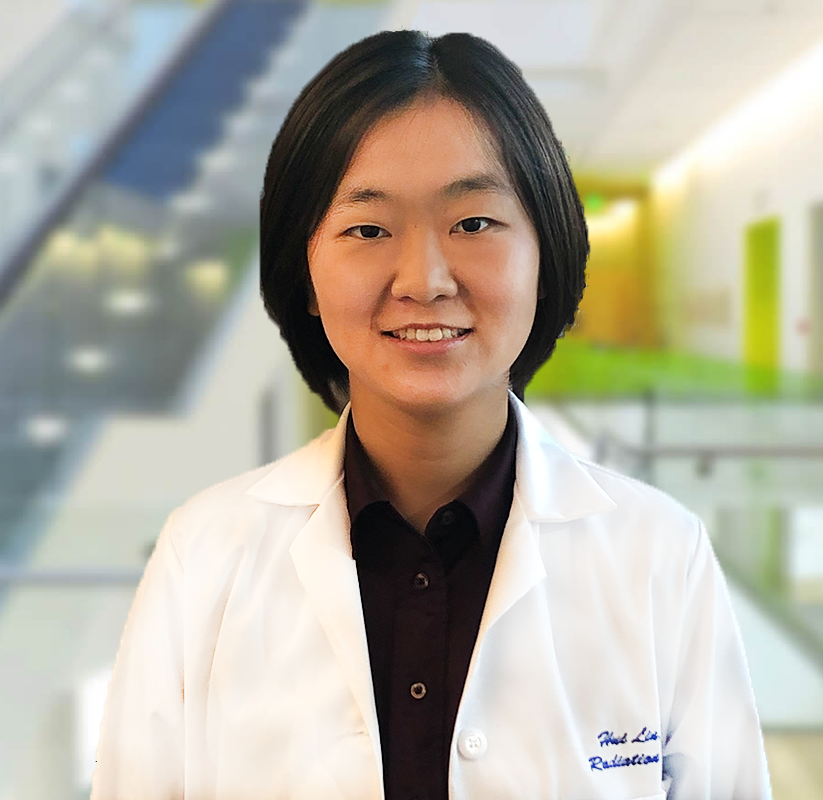Our Team

Hui Lin, PhD
Assistant Professor in Residence
Division of Physics
Department of Radiation Oncology
Board gamer, Foodie, Hiker
Meet Dr. Lin
I am motivated to deliver excellent care to our patients, translate state-of-the-art technologies to advance cancer treatment, and educate next-generation.


Dr. Lin is an Assistant Professor in Residence at the UCSF Department of Radiation Oncology. She went to the Special Class for the Gifted Young at Xi’an Jiaotong University and received her bachelor’s degree in Nuclear Science and Engineering, before starting her Ph.D. in Nuclear Engineering at Rensselaer Polytechnic Institute. During this time, her research focused on exploring advanced computational technologies to advance medical physics, including GPU computing, machine learning and computational human phantom development. She completed her three-year therapeutic medical physics residency at University of Pennsylvania and was the Chief Resident in her final year. During her time at UPenn, her research focused on Artificial Intelligence-based cardiac substructures auto segmentation and Machine Learning-based tumor motion prediction, and the projects were awarded internal and vendor grants during her residency. Her research interests range from AI-based automated segmentation, predictive multi-omics modeling and data-driven automation of clinical processes.
Education
|
Professional Experience
|
Awards & Honors
|
 |
https://www.ncbi.nlm.nih.gov/myncbi/1huY08azew95e9/bibliography/public/ https://scholar.google.com/citations?hl=en&user=SKmlf_QAAAAJ
Significant Publications
Lin, H., Shi, C., Wang, B., Chan, M.F., Tang, X. and Ji, W., 2019. Towards real-time respiratory motion prediction based on long short-term memory neural networks. Physics in Medicine & Biology, 64(8), p.085010. Prepared: October 28, 2021 Yoon, S.W., Lin, H., Alonso-Basanta, M., Anderson, N., Apinorasethkul, O., Cooper, K., Dong, L., Kempsey, B., Marcel, J., Metz, J. and Scheuermann, R., 2020. Initial Evaluation of a Novel Cone-Beam CT-Based Semi-Automated Online Adaptive Radiotherapy System for Head and Neck Cancer Treatment–A Timing and Automation Quality Study. Cureus, 12(8). Barsky, A.R., Lin, H., Mendes, A., Dreyfuss, A., Wright, C., Anstadt, E.J., Berman, A.T., Levin, W.P., Cengel, K.A., Anderson, N. and Dong, L., 2020. Initial Clinical Experience Treating Patients With Lung Cancer on a 6MV-Flattening-Filter-Free O-Ring Linear Accelerator. Cureus, 12(9). Mao, L., Liu, T., Caracappa, P.F., Lin, H., Gao, Y., Dauer, L.T. and Xu, X.G., 2019. Influences of operator head posture and protective eyewear on eye lens doses in interventional radiology: a Monte Carlo study. Medical physics, 46(6), pp.2744-2751. Lin, H., Zou, W., Li, T., Feigenberg, S.J., Teo, B.K.K. and Dong, L., 2019. A super-learner model for tumor motion prediction and management in radiation therapy: development and feasibility evaluation. Scientific reports, 9(1), pp.1-11. Liu, T., Wolfe, N., Lin, H., Carothers, C.D. and Xu, X.G., 2018. Performance study of atomic tally methods for GPU-accelerated Monte Carlo dose calculation. In 20th Topical Meeting of the Radiation Protection and Shielding Division of the American Nuclear Society. Lin, H., Liu, T., Shi, C., Petillion, S., Kindts, I., Weltens, C., Depuydt, T., Song, Y., Saleh, Z., Xu, X.G. and Tang, X., 2018. Feasibility study of individualized optimal positioning selection for left-sided whole breast radiotherapy: DIBH or prone. Journal of applied clinical medical physics, 19(2), pp.218-229.
|

